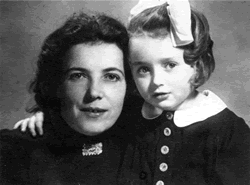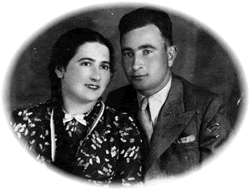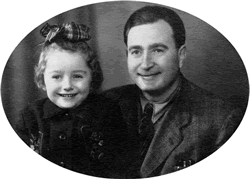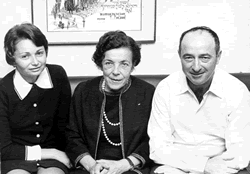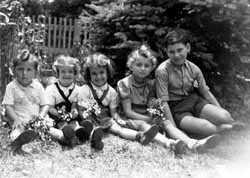"The Hand of a Child Around a Mother's Neck"
Leokadia Jaromirska
Poland
1. Shifra with Leokadia Jaromirska
Leokadia Jaromirska lived in the Warsaw suburb of Bialoleka. One
morning in October 1942, while on her way to work with another woman,
they heard the cries of children and saw a little girl and an
eight-month-old baby abandoned near the fence of a convent. Years
later she described how they picked the children up. Leokadia
convinced the other woman to take the girls home with her. After work
she hurried back to the other woman's home, where she found out that
the woman had panicked and brought the older girl to the police
station. Leokadia took the baby home with her.
As the situation of the Jews worsened, some parents, knowing that soon
all the Jews would be killed, took the terribly hard decision to
separate from their children in the hope that someone would adopt
them. In a desperate attempt to save their child, Golda and Gershon
Jonisz left their daughter near the convent wall and returned to the
Warsaw ghetto.
2. Shifra’s parents, Golda and Gershon Jonisz
Leokadia was childless. Her husband, Bolek, had been arrested in 1940
and taken to Auschwitz as a political prisoner. Although she was
barely able to make ends meet working in a German factory, she decided
to adopt the baby, whom she named Bogumila (God's beloved), nicknamed
Bogusa. Out of her meager income, Jaromirska paid for a girl to look
after little Bogusia while she was at work. She somehow managed to
support herself and the child as well as to find some money to send
packages to her husband.
As the Russians approached Leokadia was forced to evacuate. She took
the child along and the two wandered from one place to another,
constantly searching for food and for a place to sleep. Although
conditions were terrible, Bogusia remembered only the warmth and love
that Jaromirska enveloped her with. By force of her enormous love,
Jarmoirska managed to protect the child from the dangers and the cold,
and nursed her when she fell ill.
When the war ended, Jaromirska's husband Bolek returned from Auschwitz
weak and exhausted. The couple returned to Bialoleka where they lived
in a destroyed house and tried to return to normal life.
In October 1945 – three years after he had left her near the convent
fence, Bogusia's father, Geniuk (Gershon) Jonisz managed to trace her
and arrived at Jaromirsk's home. He had survived the ghetto and camps,
but his wife had been murdered in Majdanek. Convinced that his baby
daughter hadn't survived and that he had lost everything, he decided
to leave Europe. He began to make his way to Italy. He later recounted
that it was an Italian fortuneteller who told him that "a small soul
was waiting for him", that made him retract in the last minute and
return to look for his child. Somehow he found Jaromirska, and was
able to identify the child through her birthmark. He demanded to take
the little girl with him. The idea to part from Bogusia broke
Leokadia's heart, and she pleaded with Jonisz to leave the child with
her. Eventually she had to give in and was stricken with grief when
the child left with her father.
3. Shifra with her father, after the war
Bogusa, whose real name was Shifra Jonisz (later Kocer), immigrated to
Israel with her father. When she grew up she became a member of
Kibbutz Sha’ar Ha-Golan in the north of Israel. Eleven years after
they parted, Shifra began writing letters to Leokadia. Since she had
never learned to read and write Polish, she used the help of a Polish
speaking Kibbutz member. However it was Shifra’s husband who enhanced
the connection to her rescuer. Shifra and her husband Yoram Kocer had
three children. It was the husband who began corresponding with
Leokadia and asked her to fill in the gaps in his wife's early
childhood. It was through this intermediary, that Leokadia told the
story of their life together.
"Dear Yoram", Leokadia ended her long letters, "I have finished
telling my story. It is not my fault that there is not much joy in it.
I tried as best as I could because I am unable to touch these matters
and open old wounds. But you had asked me to, and I tried to fulfill
your request. I know that my story may perturb your tranquility for a
long time, and I, too, will suffer the consequences. Now you will not
reproach me for being upset that Bogusia is working in the [kibbutz]
kitchen. I felt your anger from the first letter. In my eyes she
deserves to have a royal crown. But love is the most important thing.
You love each other and have your own treasures, and this is worth
much more. Because the hand of a child around a mother's neck is the
most beautiful necklace, and nothing can replace it.
I apologize if something I have said is not to your liking.
I kiss you,
Mother"
In November 1968 Jaromirska was recognized as Righteous Among the
Nations by Yad Vashem.
Again it was Yoram who had invited her to visit them in Israel. But
the meeting was never to take place. By the time Jaromirska came to
Israel in 1969, Yoram had been killed during his reserve military
service. Leokadia came and spent six weeks with Shifra and her family,
and the two of them planted a tree in Leokadia's honor in the Avenue
of the Righteous at Yad Vashem.
4. Shifra (left) and Leokadia Jaromirska during her visit to Israel
For Additional Pictures Click Here
Shifra with other children after the war
